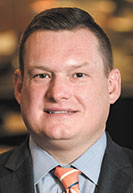Subscriber Benefit
As a subscriber you can listen to articles at work, in the car, or while you work out. Subscribe NowOfficials at the Indianapolis Department of Public Works say the task of locating funding to maintain the city’s 3,400 miles of roadway beyond the next five years keeps them up at night.
The city’s current strategy of issuing debt to gain road funding soon will become irresponsible, DPW Director Brandon Herget recently told a City-County Council committee.
So Mayor Joe Hogsett’s administration again will ask the Legislature next year to change the state’s road-funding formula so it stops favoring rural areas over Indianapolis and other densely populated cities.
But some city-county councilors are so tired of waiting on the Legislature to act that they are suggesting exploring city-based solutions. A few have quietly suggested city leaders at least consider diverting revenue from other departments or examining the potential impact of an increase in Marion County’s wheel tax—something the Hogsett administration has opposed.
In a budget hearing for DPW, Herget touted the administration’s success in increasing funding for major road projects over the past decade.
The capital budget for street projects increased from $79 million in 2017 to $200 million for 2025, but that number is slightly lower than for 2023 and 2024. Herget noted the downward trend, saying the revenue is “starting to flatline.”
The city issued $50 million in new road bonds earlier this year through a special taxing district called the Metropolitan Thoroughfare District, which covers all of Marion County. That debt is paid back through state and local road funds. An additional $40 million in bonds will be used to fund the next five years of city roadwork, but DPW spokesman Kyle Bloyd said those bonds won’t be issued if an analysis of resources finds the debt could jeopardize the city’s AAA credit rating.

Back to the Legislature
The city’s grim reality has the Democratic mayor’s administration headed back to the Republican-controlled and rural-leaning Legislature to again ask for a change in the road-funding formula.
A special two-year state task force, formally named Funding Indiana’s Roads for a Safer, Stronger Tomorrow, is set to make its recommendations to the Legislature by the end of the year.
Hogsett administration officials hope to get the panel to consider a road-funding formula change first pitched by the mayor last summer that he said could provide $49 million yearly in new infrastructure funding for Marion County and $96 million for the nine central Indiana counties.
The current formula allocates funds based on the length of a road, or center-line miles, but does not factor in the number of lanes on those roads. Studies say the formula creates a funding shortfall in more-populated counties with wider, heavily traveled roads.
Hogsett proposes that road funding be calculated based on vehicle miles traveled, which is measured by the total annual miles of vehicle travel in a certain area divided by the total population in that area. The mayor has called it a common-sense plan, since it would allow more heavily trafficked, worn-down roads to receive more funding.
The state road funding task force is expected to hold three meetings before the end of the year. Its Republican co-chairs, State Sen. Ryan Mishler of Mishawaka and Rep. Jeff Thompson of Lizton, did not respond to requests for comment on whether they would be open to changing the formula.
Hogsett’s administration is also angling for a different line of road funding from the state, an effort that appears to have little hope. It focuses on folding funding for the application-based Community Crossings road grant program into the broader road-funding formula.
The matching state-local grant provides up to $1 million to local communities toward a major capital project—which is transformational for smaller communities, but for Indianapolis barely makes a dent.
“Community Crossings, I can tell you, is not going to go away,” pledged Rep. Jim Pressel, a Rolling Prairie Republican and chair of the influential House Roads and Transportation Committee. However, he noted that he represents just one vote on the task force.
Instead, he said, he would favor a temporary, project-specific solution to Indianapolis’ road-funding woes over a change to the funding formula.
He also mentioned the possibility of a compromise, where Indianapolis’ roads could be funded at a slightly higher rate per mile. “Allow them, say, 1.2, instead of funding just 1-for-1, right?”
Sen. Fady Qaddoura, an Indianapolis Democrat who served as the city’s chief financial officer before being elected to the Legislature in 2020, said he sees reason to be optimistic that some changes will be made to the state’s road-funding system.
He predicted that a drop-off in fuel tax revenue, caused by an increase in electric vehicles, will force the issue.
At the same time, Qaddoura said, some of his Republican colleagues recognize that Indianapolis—and the central Indiana region as a whole—needs investment in infrastructure.
For now, Herget told councilors, the city is building the necessary relationships with lawmakers to turn the tide.
“We’re going to have to continue to have that discussion at the Statehouse,” he said.
Tired of waiting
At least three Democrats and one Republican on the Democrat-dominated, 25-member City-County Council have expressed support for a review of potential local revenue sources or a rearrangement of the city budget. These suggestions have gone so far as to hint at increasing the county wheel tax, which is a portion of the fees motorists pay when purchasing or renewing license plates.
Andy Nielsen, a first-term Democratic councilor representing the east side, asked his colleagues to “be mindful of the impact of user fees, especially our county’s optional excise wheel tax.” He told his council colleagues that the legislative body needs to have “a very serious and intentional conversation about how we bring more revenue online for what is arguably the issue that all of us hear the most about.” Nielsen later told IBJ that should involve evaluating the current use of all available revenue sources.
Democrat Dan Boots said that the solution shouldn’t come through additional taxes and that the city needs to get more creative as American Rescue Plan Act funds fade away. The city has been “drunk on federal money,” he said, and “now we’re waking up with a hangover.”
Democrat Jesse Brown has addressed the issue from a pedestrian-safety point of view.
“I am sick of balancing the budget on dead children, which is what we’re doing right now by underfunding DPW,” Brown said recently. “I will gladly pay more in taxes for a better outcome, and people in my district, like 80-to-20, agree with that.”
Republican Josh Bain expressed reluctance to simply rely on the hope that the state road-funding formula will change.
“I get very leery when it feels like we’re putting all of our eggs in the basket of seeing the road-funding formula get adjusted,” he said. “And I think it’s more of a hypothetical for us to assume that it does change, versus it remaining the same.”•
Please enable JavaScript to view this content.






Central Indiana should get of the bulk of the funding. That’s where people want to live.
It is crazy when you drive out in the country and they have perfectly paved roads that you never see anyone on and then you drive to work in Indianapolis and you feel like you are driving off-road.
That’s what happens when you let people from the dying parts of Indiana control the purse strings.
It’s infrastructure welfare.
Vote All mutts out that are hendering progress!!!!!
I should study more because I see orange barrels everywhere.
Looking over the past year I’m noticing a lot of state and federally subsidized development.
For the sake of our near and far future we better get our sh#$ together. That 2.5 trillion dollar debt is going to come to an end. I really feel we need some stronger leadership.
Yep. The State and its cities love to accept Billions in Federal funds to build massive new roads and infrastructure, then don’t put a single cent towards the maintenance of any of it.
If you let your house crumble and take out a loan to build a bigger one next door, instead of just fixing the roof, is that fiscally responsible? That’s what the Statehouse seems to think.
This is a state that takes the federal money intended for the care of the elderly and spends it on shiny new hospitals and CEO salaries. What were you expecting?
Bet the IBJ will have this Joe story on the front page for days on end
I’d like to see the IBJ interview the Marion County Republicans and get them on the record.
Talk to Freeman and Speedy and McGuire and Crider and Behning and Young and Jeter and Carrasco and get real actual quotes about what they plan to do. Are they just gonna kneel down and be good party soldiers and let their constituents continue to subsidize everyone else, or are they willing to stand up for their constituents and fight for actual road funding for Marion County?
Perhaps a drink will help the mayor.
Joe B, don’t worry. The IBJ employees will be working overtime to rehabilitate the image of your drunken sexual predator mayor. Not that it matters. If he was up for reelection tomorrow you and your fellow Democrats would reelect him by a landslide.
Greg Ballard won two elections for mayor in the last 20 years as a Republican.
Hogsett wouldn’t be mayor if there was a functioning Marion County Republican Party, Chuck. You point out all his flaws and they still can’t find anyone to run.
They should be working NOW on that. Instead they’re just waiting on the Statehouse to run interference for them… which does nothing to help them win local elections. Why would Indianapolis residents vote for people who just want to tell them that they’re wrong all the time?
I’m guessing unincorporated Rolling Prairie, Indiana gets plenty of road funding.